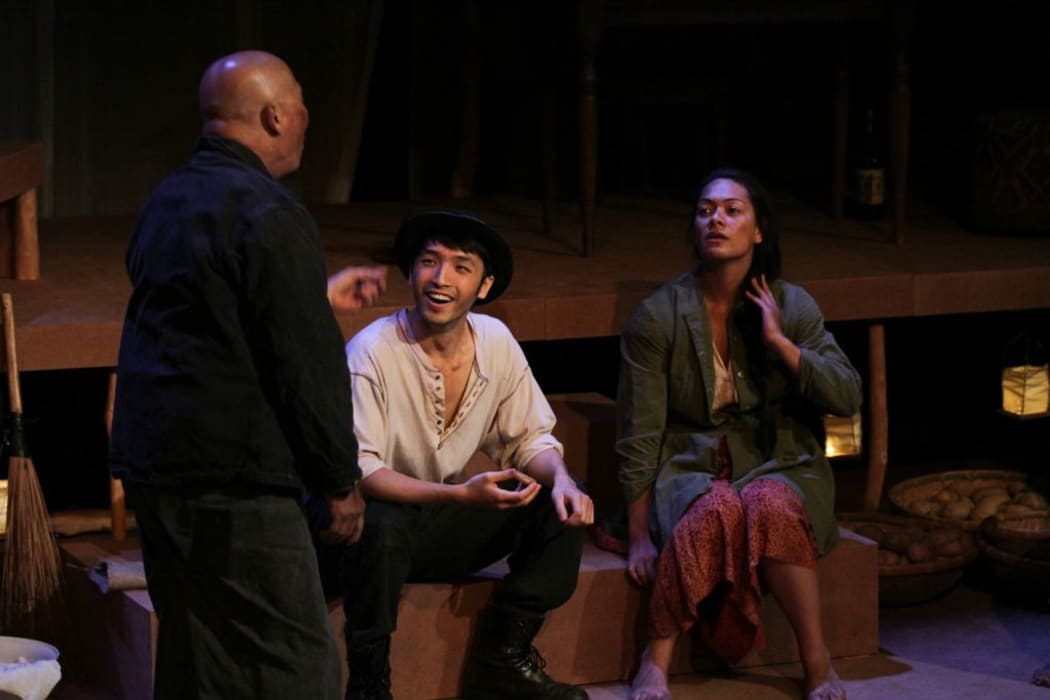
Choi (Charles Chan) jokes with Yee and Elsie Photo: Gate Photography courtesy Auckland Arts Festival
Women - ha! and Maori, they don't understand us!
Charles Chan as Choi, the old Chinese Market gardener - excerpt from The Mooncake and the Kūmura by Mei-Lin Te Puea Hansen.
Yee, played by Yosan An is a young Chinese labourer, he’s discussing Maori women needing work with Choi, an old Chinese market gardener. It sets the scene for a love story between Chinese and Maori around 90 years ago, at a time when these communities were very poor and marginalised.
The play The Mooncake and the Kūmara, was a sold out hit at the recent Auckland Arts Festival earlier this year. The themes, an exploration of the lives of Chinese and Maori market gardeners in New Zealand is loosely based on the family history of writer Mei-Lin Te Puea Hansen – about her Maori and Chinese grandparents.
You're greeted by the crowing of roosters and squealing of piglets at the gates of the Totaranui Orchards in Otaki, an area steeped in market gardening history – and the home of Auckland Arts Festival director Carla van Zon.
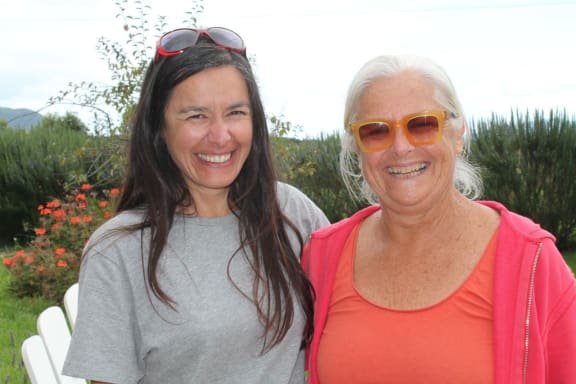
Playwright Mei-Lin Te Puea Hansen and Carla van Zon at Totaranui Orchard Photo: RNZ/Lynda Chanwai-Earle
Mei-Lin is Carla's house guest and as far as market gardening stories go - this is the perfect setting for our interview. We’re surrounded by free range chooks, pigs and the heady aromas of homemade cider made from the sprawling apple orchard as Mei-Lin tells me about the inspiration behind her play, the love story between her grandparents Nan and Goong-goong.
It was a call out for short plays (about Asian themes or written by Asian writers) from The Oryza Foundation in Auckland which first prompted Mei-Lin to write the play with her cousin Kiel McNaughton in 2008. This production is an ‘extended’ version of their 10 minute original.
The play is based on the "true" life story about how Mei-Lin's Maori grandmother Alice Williams (Nan) and Chinese grandfather Joe Kum Chee (Goong Goong) met in 1929. Collective family histories are always open to interpretation and MeLin's version is just that.
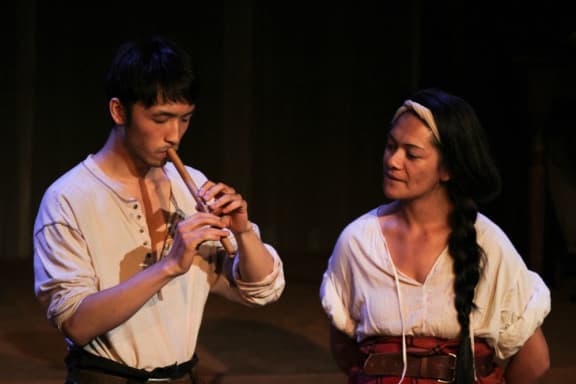
Yosan An as Yee plays flute for Elsie (Awhina-Rose Henare Ashby) Photo: Gate Photography courtesy Auckland Arts Festival
Chu Moi 徐妹 was the name of Joe Kum Chee's first wife. It was common for Chinese men to leave loved ones and family back home to seek work around the globe, at first in gold-mining and later in market gardening, labouring and laundry services.
According to the New Zealand Chinese Association publication Sons of the Soil Joe Kum Chee came from the village of Nam Ling, in the Poon Yue district, Canton. Joe arrived in New Zealand in 1924 at the age of 21 with his father. Joe and his father laboured on market gardens around the Stratford area. This is where Joe at the age of 26 met Alice Williams - a decade younger than him.
Alice Williams came from the Tainui settlement at Ngāruawāhia, and a new marae called Tūrangawaewae. The leader of the marae was the whaea Te Puea Hērangi (1883–1952) the granddaughter of Tāwhiao Te Wherowhero, the second Māori King.
Te Puea emerged as a leader during the First World War. She opposed the government’s policy of conscripting Māori for war service, at a time when Tainui invasion and confiscation of their lands. After the war Te Puea helped set up the Tainui settlement, the new marae and the fledgling King Movement (Kīngitanga). The settlement became a kind of ‘national marae’.
Te Puea hosted politicians and dignitaries and helped restore the national status of the Kīngitanga. She became a crucial figure in reviving the Kīngitanga (King Movement) among Tainui people in the twentieth century. Alice Williams's mother was one of the whaea that helped host at the marae.
Mei-Lin laughs as she tells me that there are many nostalgic versions of how her grandparents met but Mei-Lin's version is probably closest to the truth of the gritty, harsh realities of the times. Market gardening wasn't a stroll in the meadows, it all about survival and sheer hard graft.
They're moving where the money is, they're all on the make. They just want to survive.
"They were so poor, both Goong and Nan. Nan's father had died, so where is this mum [Mei-Lin's great-grandmother] with her 10 children going to find a way to feed and clothe all these children? Nan was only 16 when she got together with Goong."
It was tough times for Maori and Chinese - the Great Depression, post W.W.1. and entering the era of W.W.2. Joe and Alice went on to purchase green grocer and fruit shops in Stratford and Hawera from 1937 to 1945 before moving to Palmerston North and gradually expanding their market gardening business.
According to Mei-Lin Joe and Alice had around 13 children and Joe and Alice continued to toil on their gardens throughout each pregnancy. "The older siblings became the babysitters."
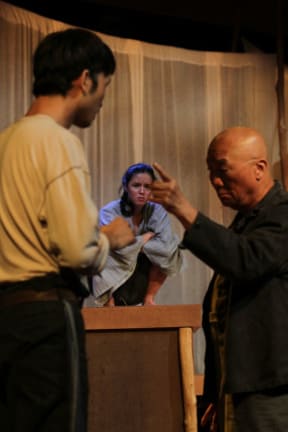
Leilan (Chye-Ling Huang) is forgotten first wife back in China Photo: Gate Photography courtesy Auckland Arts Festival
Mei-Lin is the first Maori-Chinese playwright to bring to New Zealand's audience a play with an entirely Maori and Chinese theme.
Carla van Zon, Director of the Auckland Arts Festival is quick to point out that The Mooncake and the Kūmura was selected on the merit of its' writing.
Festival director Carla Van Zon is about to feed her 40 odd piglets, Carla tells us she loved this play from the outset because of its earthy authenticity. She loved the fact that the older hardened Maori and Chinese characters grew softer in the telling of the play, losing their racist misconceptions of each other.
Mei-Lin pays particular credit to Katie's direction. "It was great to have Katie Wolf direct, she comes from Taranaki and she could relate to the Maori side of my family."And what about the title? Mei-Lin tells me she liked it because it was evocative of Aesop's fables;
"Threaded throughout the play are fables, where the Chinese characters tell Maori legends and Maori characters tell Chinese fables, with lots of artistic license of course!"
The debut season sold out and there are plans to tour this to festivals around the country, Carla and Mei-Lin would like to premiere it for one night in Otaki too, for the population of market gardening families in the region.
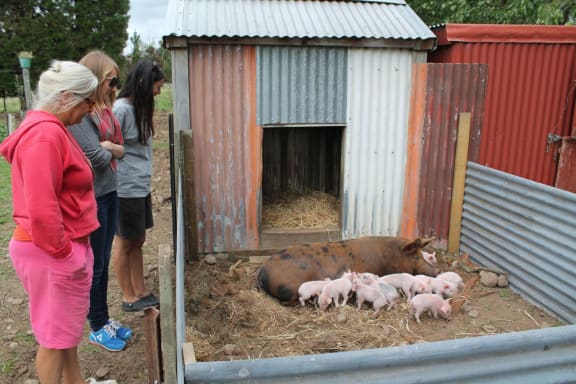
Piglets at home, Playwright Mei-Lin Te Puea Hansen and Carla van Zon at Totaranui Orchard Photo: RNZ/Lynda Chanwai-Earle
After all - it is a love story set among rows and rows of potatoes. Who wouldn't be enamored with that?
The Mooncake and the Kūmara
Auckland Arts Festival 5th – 10th March 2015, at the Loft, Q Theatre, Auckland.
Playwright: Mei-Lin Te Puea Hansen
Direction: Katie Wolfe
Cast: Yoson An, Charles Chan, Kip Chapman, Awhina-Rose Henare Ashby, Waimihi Hotere, Chye-Ling Huang
Design Team: John Verryt, Paul Lim, Drew McMillan, Elizabeth Whiting
Play excerpts recorded at the Loft, Q Theatre, Auckland, NZ by Justin Gregory and Aleyna Martinez for Radio New Zealand.

